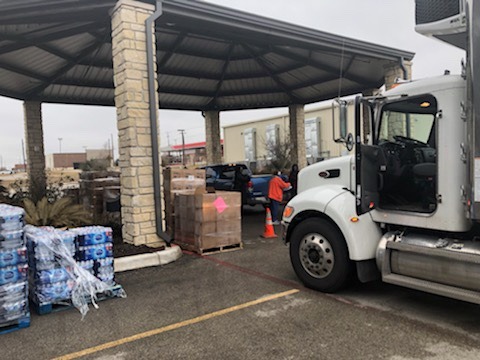
- Details
- By Chuck Hoskin Jr
When a natural disaster occurs, our response can reveal our deepest values. The Cherokee Nation believes in “gadugi” – working together to better our tribe and for the greater good. Our talented workforce at Cherokee Nation and Cherokee Nation Businesses lived up to this value during the treacherous 2021 winter storm that hit our communities in February.
The weather emergency proved the immense importance of Cherokee Nation to the families and communities of northeast Oklahoma. Thanks to our dedicated team, we were able to seamlessly pause operations during the record-setting low temperatures and hazardous conditions. To help ease growing concerns around energy consumption during the weather event, we conserved precious energy resources by temporarily closing our casino properties and hotels, cultural museums, retail operations, and several office locations.
That responsible leadership meant more energy would be available for critical community functions and for both Cherokee and non-Cherokee residents on our reservation. Our partners – including city and county officials and area utility companies – have praised Cherokee Nation and CNB for helping the whole community avoid widespread blackouts and other potentially catastrophic failures.

Our efforts didn’t stop there. All across the Cherokee Nation reservation, Cherokee homeowners were impacted by frozen waterlines caused by the frigid temperatures that often dipped below zero for several days. Homes were damaged by the bursting waterlines, and families found themselves without access to clean water. That’s why we rolled out a $4 million effort to help Cherokee homeowners living within the reservation repair plumbing problems caused by the winter storm. Our teams also worked with rural fire departments and community groups to provide clean drinking water, emergency food supplies, milk and heating assistance to those who needed it.
Deputy Chief Bryan Warner and I are always proud to roll up our sleeves and work side by side with the team at Cherokee Nation. These unprecedented times have reinforced our belief that Cherokee Nation and CNB are full of professionals who operate with a moral conscience and execute their individual responsibilities at an extraordinarily high level.
The damage from the winter storm went far beyond northeast Oklahoma, so Cherokee Nation reached out to citizens in hard-hit places like Texas. The tribe worked with satellite Cherokee community groups in Dallas-Fort Worth, Houston, Austin and San Antonio to provide emergency food, water and milk supplies to those affected by water shortages and power outages.
We sent a semi-truck full of supplies to each of those sites and provided about 444,500 meals to almost 7,100 Cherokees. Cherokee satellite groups in Texas hosted distribution events, and our Cherokee Nation Community and Cultural Outreach team delivered the supplies. These donations came at a critical time to help our fellow Cherokees survive the storm and get back on their feet.
We collaborated with our federal partners at the United States Department of Agriculture to utilize the Farmers to Families Program for this effort. Working with USDA, we have served thousands of Cherokee people in rural Oklahoma since the pandemic began, and the agency appreciated our tribe’s creative efforts to help Texas-based Cherokees in need.
Not only has our team battled the weather, but we continue to work safely and responsibly through the COVID-19 pandemic. It’s been a challenging year, but we have never slowed down efforts to help our communities while taking strong public health precautions to prevent the spread of the virus. Getting the vaccine, wearing a mask, washing your hands, and watching your distance continue to be necessary to protect Cherokee families.
Gadugi is the Cherokee spirit that lives through the dedication of every Cherokee Nation employee working together for the betterment of our citizens. This core value has seen us through many times of emergency and hardship, and it will see us through this one as well. As a strong government, a supportive community, and a cultural and economic force, Cherokee Nation continues to look out for all of our citizens.
Chuck Hoskin, Jr. is the principal chief of the Cherokee Nation.
More Stories Like This
Tribes Seek Better Data, Real Accountability in MMIP Cases Ahead of Tribal ConsultationWhat Would Dr. King Say About ICE?
In Unity and Commitment
Protecting Our People through Human Trafficking Awareness
It is Time for Animal Behavior to Become Its Own Discipline
Help us defend tribal sovereignty.
At Native News Online, our mission is rooted in telling the stories that strengthen sovereignty and uplift Indigenous voices — not just at year’s end, but every single day.
Because of your generosity last year, we were able to keep our reporters on the ground in tribal communities, at national gatherings and in the halls of Congress — covering the issues that matter most to Indian Country: sovereignty, culture, education, health and economic opportunity.
That support sustained us through a tough year in 2025. Now, as we look to the year ahead, we need your help right now to ensure warrior journalism remains strong — reporting that defends tribal sovereignty, amplifies Native truth, and holds power accountable.
 The stakes couldn't be higher. Your support keeps Native voices heard, Native stories told and Native sovereignty defended.
The stakes couldn't be higher. Your support keeps Native voices heard, Native stories told and Native sovereignty defended.
Stand with Warrior Journalism today.
Levi Rickert (Potawatomi), Editor & Publisher
